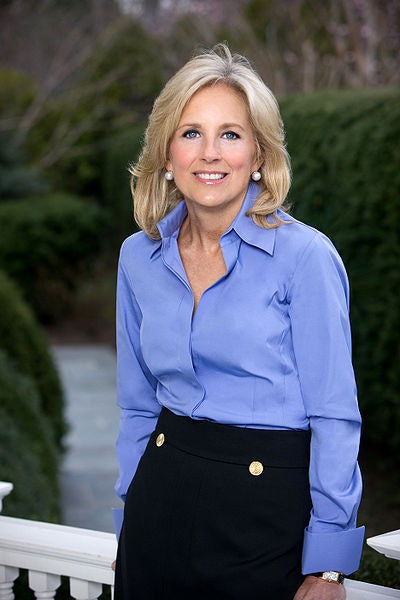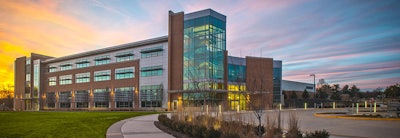With President-elect Joe Biden preparing to take office in January, this might be community colleges’ big moment.
The institutions’ advocates are already celebrating what a Joe Biden presidency could mean for the community college sector.
“Certainly I think all of us at community colleges are hopeful that the Biden administration will be centering community colleges, and frankly public open access education, in the middle of their policy agenda,” says Dr. Karen A. Stout, president and CEO of Achieving the Dream, a non-profit focused on community college student success.
Community college leaders have reason for hope.
 Dr. Jill Biden
Dr. Jill BidenBiden’s higher education platform on his campaign website refers to community colleges more than 30 times.
In it, he champions making two years of community college tuition-free through a federal-state partnership in which the federal government chips in 75% of the cost.
That includes free tuition for part-time students, adult learners and recipients of the Deferred Action for Childhood Arrivals (DACA) program, groups that frequent community colleges but are often left out of state free college programs. A report by the Education Trust found that 14 of the 23 existing free college programs exclude non-traditional students, like older adults and returning students, who did not enroll in college immediately after high school. DACA students can only participate in about half of free college programs.
“Finances continue to be a barrier for our students to access and succeed in colleges, so [community college leaders] are excited about the prospect of basically getting what amounts to greater support for students in the form of reduced tuitions,” says David Baime, senior vice president of government relations and policy analysis at the American Association of Community Colleges (AACC).
On top of that, Biden promised to create a new grant program focused on increasing student supports and implementing evidence-based practices for retaining and graduating community college students. A first-dollar community college initiative would also allow low-income students to put their Pell Grant funds toward non-tuition expenses like textbooks, room and board.
Biden’s platform also emphasizes offering financial incentives to states that promote partnerships between community colleges and local organizations that can provide wraparound supports for students.
Finally, the plan includes an $8 billion investment in community college facilities and technology and a $50 billion investment in workforce training, like community college business partnerships and apprenticeships.
The challenges ahead: COVID-19 and bipartisanship
These are ambitious plans, and community college advocates recognize that addressing COVID-19 will need to be Biden’s first task.
“I think top of mind will be the pandemic,” Stout says. “The pandemic has disproportionately impacted students of color and low-income students, students who are in our nation’s community colleges. That first agenda of tackling the coronavirus pandemic will be a key driver for recovery and improved equity within our communities and the higher education system.”
But she sees support for community colleges as a part of the country’s economic revival, and Biden’s tuition-free community college program could help.

Under Biden, community college leaders hope Congress will pass a coronavirus supplemental appropriation bill, offering community colleges more financial support as they face state budget cuts, the rising costs of handling the pandemic and enrollment dips, says Baime.
Community colleges have been hit hard by the pandemic, with their freshman enrollment dropping by 18.9% this fall, according to National Student Clearinghouse Research Center data from Oct. 22.
Yet Baime sees community colleges playing a crucial role in workforce training after the pandemic, and he thinks the people now entering the White House are well-equipped to recognize community colleges’ value in a time of crisis.
Biden’s wife, Northern Virginia Community College English Professor Dr. Jill Biden, has called community colleges “America’s best-kept secret.”
In the President-elect’s victory speech, he highlighted her education advocacy.
“For American educators, this is a great day for you all,” he said. “You’re going to have one of your own in the White House.”
This is new. From Baime’s perspective, lawmakers generally don’t grasp the full extent of the challenges faced by community colleges.
“Policymakers oftentimes don’t understand just how lean community colleges are in terms of the resources they have at their disposal, the salaries they’re able to pay,” he says. Plus, “our students are just lower-income and they have much more complicated life situations that make success in college more of a challenge for students. Not that they can’t do it, not that they don’t usually do it. But it’s different when … you have a job or you have children versus an 18-year-old, full-time student.”
But Dr. Jill Biden, who previously taught remedial English, has had these students in her classroom, Baime added. She understands community colleges “thoroughly and deeply” and that’s bound to influence policy.
Meanwhile, Joe Biden himself attended a public university, the University of Delaware. That’s “unusual” in the executive branch – and it’s “important,” says Stout. “That perspective will start to move the balance back to education being a public good rather than a private good.”
Granted, decisions about the fate of higher education won’t be left to Biden and Harris alone. And depending on the outcome of Georgia’s Senate runoff election, a Republican-controlled Senate and a Democratic president might find themselves at odds.
For higher education policy, there are “flashpoints” that cause political conflict – like regulating for-profit colleges or defining free speech on campus – says Baime, but by and large, higher education is an area that traditionally garners bipartisan support.
He can imagine “way, way off in the distance” that, while a Republican-majority Senate might be unwilling to touch immigration or climate policy, it could conceivably pursue reauthorization of the Higher Education Act, the 1965 legislation that governs federal higher education programs. That was due for renewal over a decade ago, so he acknowledges it could be “wishful thinking.”
Stout is similarly confident that the mission of community colleges can rally both Republicans and Democrats, particularly for workforce development, a historically bipartisan issue.
As a part of the national advisory board for College Promise – a non-partisan non-profit advocating for programs that fund at least two years of tuition-free college – Stout has also seen “grassroots” college promise programs developed in both Republican-majority and Democratic-majority states.
“What’s great about community colleges is that we are in every legislative district in the country,” she says. “We’re in red areas, we’re in blue areas and, in every area, we make a major impact on the local community. And I think that makes us very unique and well-positioned for bipartisan support.”
For her, the Biden presidency will be an “exciting time filled with possibilities” for community colleges, and at the same time, by necessity, “compromises are going to emerge along the way.”
As someone who spent her “entire career” working for the community college sector, “this is the moment in time that you almost wait for.”
This article originally appeared in the December 10, 2020 edition of Diverse. You can find it here.


















